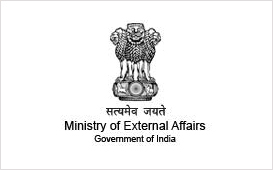General Information - Visa
Indian visas are required for foreign nationals who wish to enter India for various purposes such as tourism, business, employment, study, medical treatment, and more.
Here are the primary types of Indian visas and the general requirements:
Types of Indian Visas
1. Tourist Visa:
- For individuals visiting India for tourism, sightseeing, or casual visits to meet friends and relatives.
- Please note that, currently Tourist visas are not being issued from the Consulate for Canadian Passport holders. As and when the service is started the same will be notified. However, Canadian Passport holders can apply for e-tourist visa at https://indianvisaonline.gov.in/
2. Business Visa:
- For business-related activities such as attending meetings, setting up industrial/business ventures, or conducting commercial negotiations.
3. Employment Visa:
- For individuals employed by an Indian company or organization.
- Validity depends on the term of the employment contract.
- Please note that, currently Employment visas are not being issued from the Consulate for Canadian Passport holders. As and when the service is started the same will be notified.
4. Student Visa:
- For students who wish to pursue regular studies in recognized educational institutions in India.
- Usually issued for the duration of the study program.
5. Medical Visa:
- For patients seeking medical treatment in India.
- Can also be issued to attendants/companions coming to assist the patient.
6. Conference Visa:
- For attending conferences, seminars, or workshops organized by Indian government bodies, UN, or other recognized organizations.
7. Journalist Visa:
- A foreigner who is a professional journalist, photographer, documentary film producer or director (other than of commercial films), a representative of a radio and/or television organization, travel writer/travel promotion photographer etc; professional journalist working for an association or a company engaged in the production or broadcast of audio news or audio visual news or current affairs programmes through the print media, electronic or any other form as defined in clause (R) of sub-section (1) of section 2 of the Information Technology Act, 2000 or any other mode of mass communication; correspondent/columnist/cartoonist/editor/owner of the association or company referred to above; journalist visiting India for any other purpose, such as attending a Conference, tourism, meeting relatives etc.
8. Research Visa:
- For research scholars and academics intending to undertake research work in India.
9. Entry Visa:
- For people of Indian origin, dependents of foreigners holding long-term visas.
10. Transit Visa:
- For travelers transiting through India to reach their final destination.
11. E-visa:
- Foreign Nationals can opt to apply for some visas online without having to submit a hard copy of the form and requisite documents at a BLS center. Such visas are granted and approved online and the applicants can travel to India using the visa grant confirmation received by them.
- E-visas are currently offered in the following categories:
-
- e-Tourist Visa
- e-Business Visa
- e-Conference Visa
- e-Medical Visa
- e-Medical Attendant Visa
- e-Ayush Visa
- e-Ayush Attendant Visa
NOTE: Foreign journalists visiting India on account of tourism, conferences or personal visits are not eligible for e-Visa and must apply for a paper visa under J-Visa category.
Who Requires an Indian Visa
- Foreign Nationals: All foreign nationals require a visa to enter India. However, Overseas Citizens of India (OCI) cardholders do not require a visa to enter India.
Process of application for a visa
Step 1- Submission of application online
Please register & submit the Visa application online following the guidelines at the below link. Please carefully read the details and various provisions provided on the Visa website and follow while submitting application for Visa.
https://indianvisaonline.gov.in/
https://indianvisaonline.gov.in/visa/instruction.html
A step wise process can be seen at the below link:
https://www.cgitoronto.gov.in/docs/1717012222Step_wise_process_for_visa_application.pdf
Process for uploading photo online for visa application.
https://indianvisaonline.gov.in/visa/VSS_IMAGE.pdf
Step 2 – Submit print out of the Visa application along with the supporting documents and Fee at BLS Center.
For further details with regard to application form, documents, fees, contact details of BLS etc., please visit BLS website www.blsindia-canada.com.
Please refer the FAQs page for quries regarding the application process.
Important Details
- Acceptance of visa application does not ensure that visa shall be granted. Applicants must note that grant or refusal of visa is sovereign right of India, and it cannot be claimed as a matter of right by the applicant.
- Passport on which visa is applied must have at least 2 blank pages and must have a validity of more than 190 days. Passengers holding valid visas may be denied entry into India if the validity of their passports is less than 180 days at the time of entry into India.
- The validity of visa starts from the date of its issue and not from the date of entry into India.
- Visa applicants are advised not to purchase travel tickets before visa is obtained.
- Long-term visa holders intending to stay in India for more than 180 days are required to register at their nearest Foreigners Regional Registration Office (FRRO) or District Superintendents of Police.
- The Consulate, at its discretion, may call any applicant to attend interview in person in the Consulate General of India, Toronto irrespective of his/her location of residence. Failure to attend the interview may result in rejection of visa application.
- In case of visa for Research, Missionary work, Journalism, travel document holders, Pakistani nationals/persons of Pakistan origin and Chinese national, separate rules would apply.
- Change of purpose is not permitted on any visas, once granted.
- Foreigners entering India are advised that use or carrying satellite telephone sets such as Iridium, Inmarsat, Thuraya etc. is prohibited in India. Any violations would result in confiscation of these sets will be seized and the holder can be prosecuted under Section 6 of Indian Wireless Act and Section 20 of Indian Telegraph Act.
****














